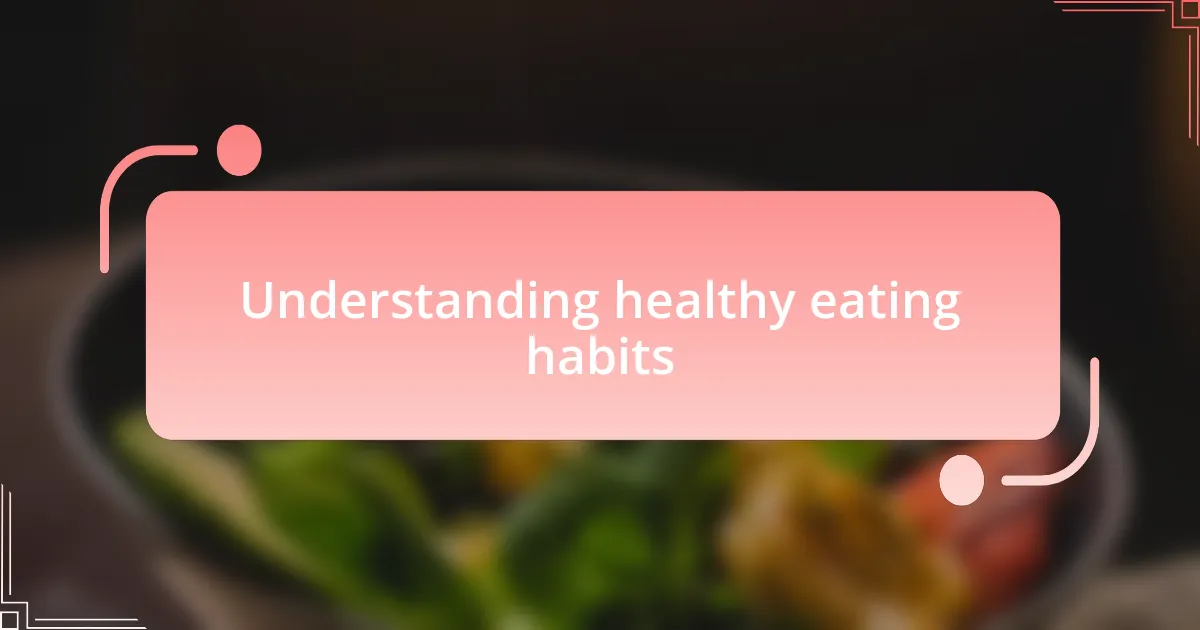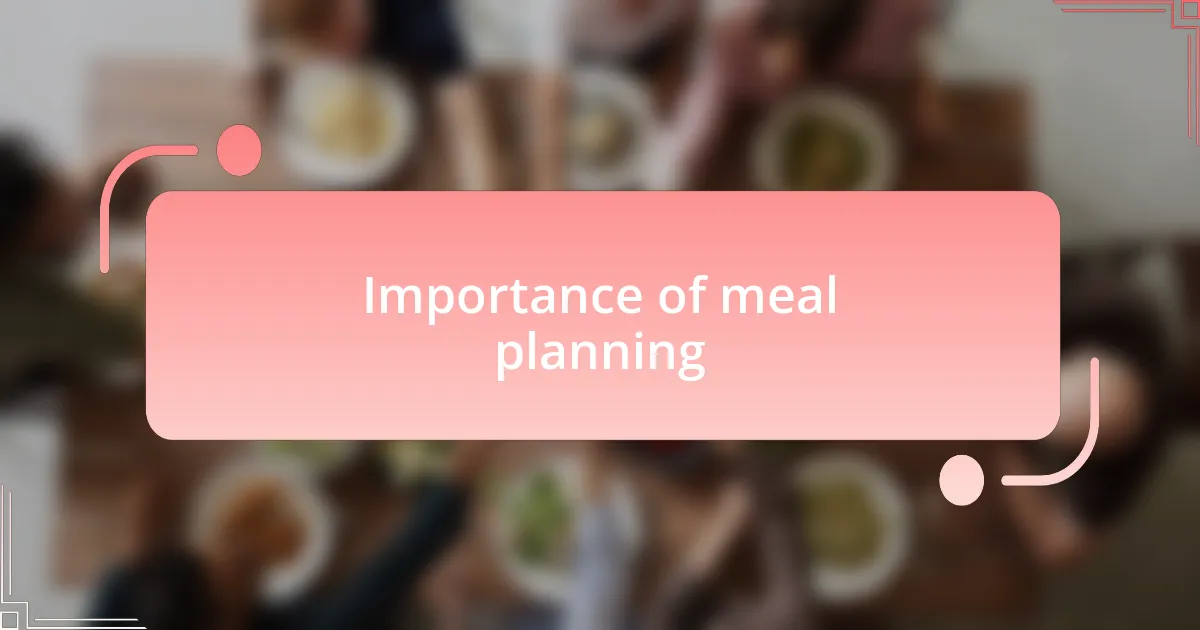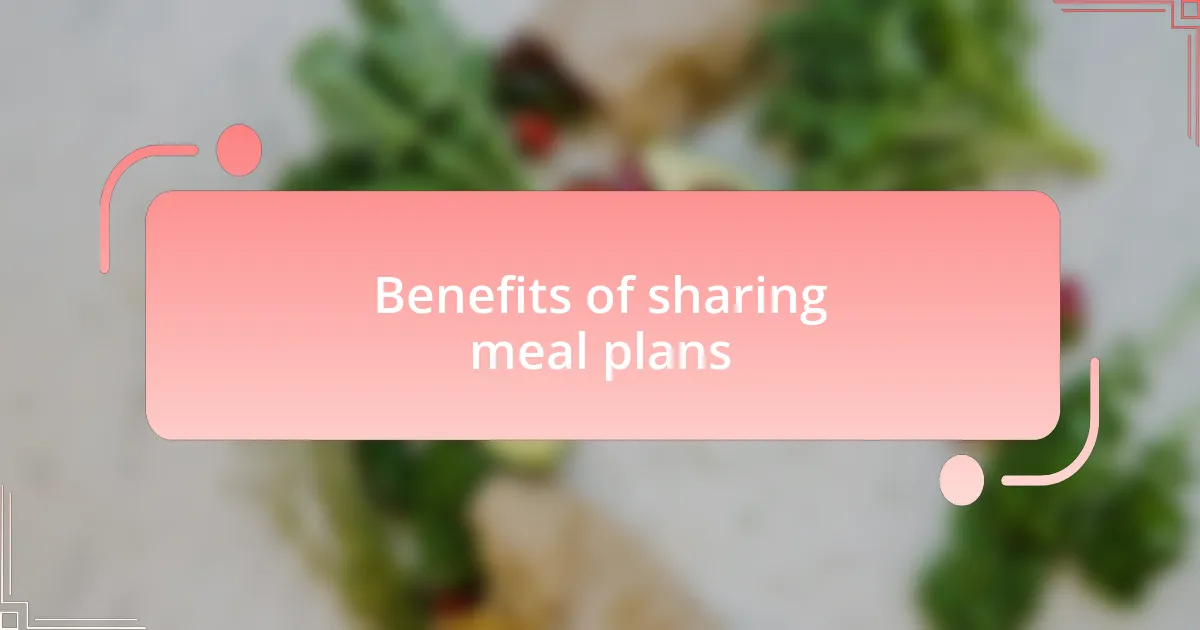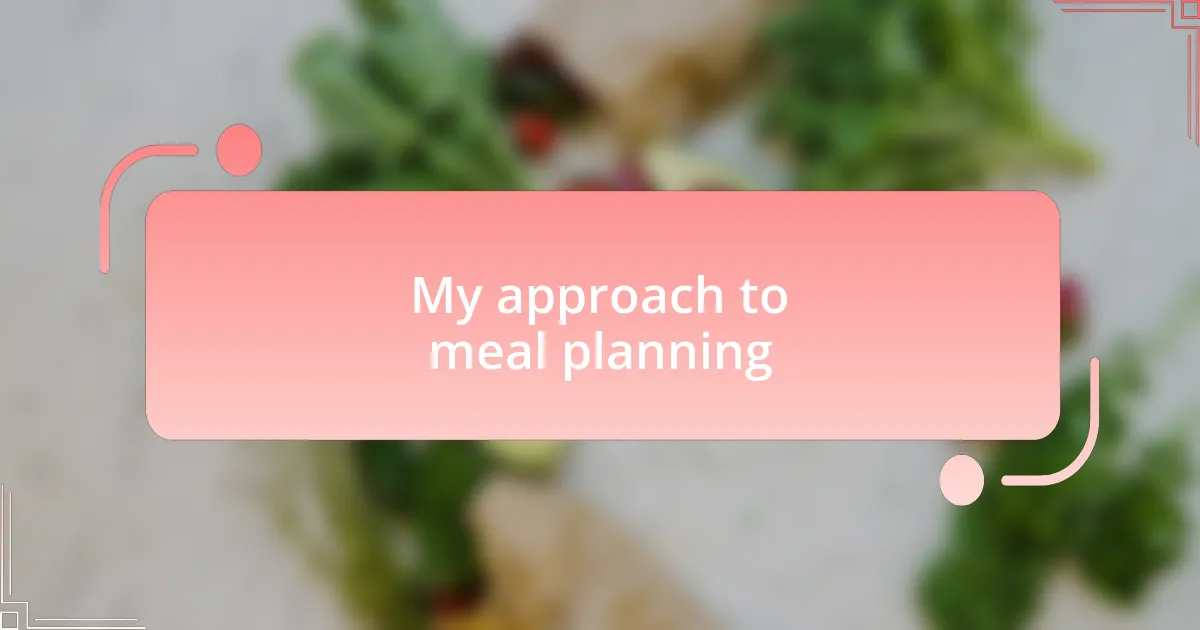Key takeaways:
- Healthy eating is about balance, mindfulness, and understanding your body’s nutritional needs.
- Meal planning helps prevent impulsive eating, reduces food waste, and promotes a joyful cooking experience.
- Sharing meal plans fosters community, accountability, and can enhance the meal preparation process.
- Emphasizing flexibility, using seasonal ingredients, and involving family can make meal planning more enjoyable and effective.

Understanding healthy eating habits
Healthy eating habits are about more than just what you put on your plate; it’s about creating a sustainable lifestyle that nourishes your body and mind. I recall a time when I mindlessly snacked while binge-watching my favorite show. That experience made me realize how easily we can fall into habits that don’t serve our health. Have you ever felt that disconnect between what you eat and how it makes you feel? Reflecting on that moment inspired me to be more mindful about my food choices.
One of the essential aspects of healthy eating is balance. I remember when I first started incorporating more fruits and vegetables into my meals; it was eye-opening to see how vibrant and energized I felt. It’s about finding that perfect equilibrium—enjoying a slice of pizza while also making room for a nutritious salad. Isn’t it fascinating how a colorful plate not only pleases the eyes but also enriches our health?
Understanding the basics of nutrition can empower you to make informed decisions. When I began tracking my meals, I discovered surprising patterns in my eating habits. Sometimes, I was undernourished without even realizing it! This journey taught me how important it is to listen to your body and recognize its needs. Isn’t it incredible how being aware can transform your relationship with food?

Importance of meal planning
Meal planning serves as a roadmap for healthy eating, allowing us to navigate our dietary choices with intention and foresight. When I first started meal prepping, I noticed how much easier it became to avoid last-minute takeout temptation. Have you ever found yourself staring blankly into your fridge, overwhelmed and hungry? Planning ahead changes that frantic energy into anticipation for nourishing meals.
There’s also a financial benefit to consider. I used to splurge on groceries without a clear plan, which often led to wasted food and funds. After I implemented a meal plan, I found that I was shopping smarter, reducing impulse buys, and savoring every bite. It’s surprising how budgeting your meals can not only save money but also enhance the experience of eating.
Moreover, meal planning cultivates mindfulness in our eating habits. I remember feeling proud of the meals I created and how that small act of preparation instilled a sense of accomplishment. When was the last time you felt that connection between effort and reward in your meals? Planning meals transforms our perspective on food from mere sustenance to a joyful expression of care for ourselves.

Benefits of sharing meal plans
Sharing meal plans creates a sense of community and accountability among friends and family. I’ve often found that when I share my planned meals with a friend, it encourages both of us to stick to our healthy eating goals. Have you ever felt more motivated when you know someone else is right there with you, cheering you on? That shared commitment can be powerful.
Beyond accountability, there’s an exchange of ideas that enriches the meal planning experience. When I started sharing recipes and meal ideas with my sister, we discovered new flavors and combinations that I would never have tried alone. This collaboration not only made meals more exciting but also fostered a deeper bond between us. Isn’t it fascinating how food can strengthen relationships?
Additionally, by sharing meal plans, we can save time and reduce stress in the kitchen. When I teamed up with a couple of friends to prepare meals together, we divided the tasks and ended up with a variety of dishes in just a couple of hours. This not only made cooking more enjoyable but also introduced an element of fun into our routines. Who wouldn’t appreciate turning a mundane task into a social event?

My approach to meal planning
When it comes to meal planning, my approach revolves around flexibility and creativity. I don’t like to box myself into rigid schedules, so I usually have a rough outline for the week but leave space for spontaneous changes. For instance, if I suddenly crave a specific dish or discover a fresh ingredient at the market, I adjust my plan. Have you ever found that some of the best meals come from improvisation?
Another key aspect of my meal planning is focusing on seasonal ingredients. I personally enjoy visiting local farmers’ markets, and I find that incorporating what’s in season not only enhances flavor but also supports local agriculture. I remember the time I bought a basket of ripe tomatoes in July, which inspired a delicious summer pasta dish. The freshness made all the difference, and it reminded me of how much joy cooking with vibrant ingredients can bring.
I also like to make meal planning a family affair. On Sundays, I gather my kids around the kitchen table, and we brainstorm meal ideas together. This not only teaches them about healthy eating but also gives them a sense of ownership over our meals. Have you seen how excited children can get when they feel involved? It transforms meal prep from a chore into a family bonding experience, and it’s moments like these that I cherish the most.